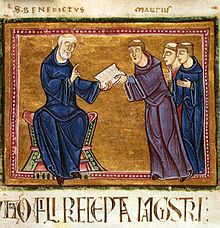 Christ and His virtues and attributes are the central focus of the Church and the Rule of St. Benedict.
Christ and His virtues and attributes are the central focus of the Church and the Rule of St. Benedict.
After three years of miracles, preaching, teaching, healing and feeding while “resolutely” heading for Jerusalem, Jesus comes up to the Last Supper where he longingly looked forward to initiate the Eucharist: “This is my body; “This is my blood;” and Holy Orders: “Do this in memory of me.” Mindful of His words, these sacraments commission the priests to bring Christ to the multitudes throughout the world.
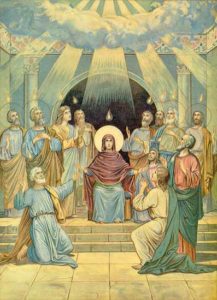 During the forty days that follow the magnificent event of Christ’s Resurrection, He accomplishes the solidification of the newborn Church as He affirms the apostles and disciples. Then comes His Ascension into heaven followed by the precious gift of the Pentecost whereby the Holy Spirit comes down upon the Blessed Virgin Mary and the Apostles that they may be emboldened to preach with holy conviction. These events are at the core of the Church’s sacred heritage. The Church is constantly challenged to bring the “good news” of Christ throughout the whole world.
During the forty days that follow the magnificent event of Christ’s Resurrection, He accomplishes the solidification of the newborn Church as He affirms the apostles and disciples. Then comes His Ascension into heaven followed by the precious gift of the Pentecost whereby the Holy Spirit comes down upon the Blessed Virgin Mary and the Apostles that they may be emboldened to preach with holy conviction. These events are at the core of the Church’s sacred heritage. The Church is constantly challenged to bring the “good news” of Christ throughout the whole world.
Thanks to the writings of the Fathers of the Church that contributed significantly to the clarification of Sacred Scripture and the spiritual growth of the Church, St. Benedict benefited greatly by this foundation. After absorbing the best of this sacred heritage, he proceeded to apply this knowledge to build up monastic life that would eventually evangelize and civilize the whole of Europe. The secret of His success was the placing of Christ at the center of all his efforts.
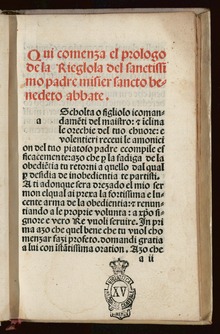 He taught us to “Renounce yourself in order to follow Christ” (RB 4:10). This theme would echo throughout the entire rule in many different forms. So we see that the abbot is believed to “hold the place of Christ, since he is addressed by a title of Christ…not for any claim of his own, but out of honor and love for Christ” (RB 63: 13.
He taught us to “Renounce yourself in order to follow Christ” (RB 4:10). This theme would echo throughout the entire rule in many different forms. So we see that the abbot is believed to “hold the place of Christ, since he is addressed by a title of Christ…not for any claim of his own, but out of honor and love for Christ” (RB 63: 13.
And, consider this: “Your way of acting should be different from the world’s way; the love of Christ must come before all else” (RB 4:20). Evil thoughts are to be dealt with swiftly and decisively, such as, “As soon as wrongful thoughts come into your heart, dash them against Christ and disclose them to your spiritual father” (RB 4:50). Although we strive to find Christ in every person we meet, how shall we deal with our “enemies?” St. Benedict advises, “Pray for your enemies out of love for Christ. If you have a dispute with someone, make peace with him before the sun goes down (RB 4:72).”
Spiritual progress is slow, so after diligently practicing the virtue of humility we arrive at love. “Through this love, all that he once performed with dread, he will now begin to observe without effort, as though naturally, from habit, no longer out of fear of hell, but out of love for Christ, good habit and delight in virtue” (RB 7:68-69).
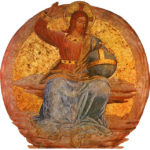 All kinds of people reside in the monastery or come for the solace of retreat or just a good word, and all represent Christ in one way or another. We are called upon to reverence them, especially those who are sick and bedridden. “Care of the sick must rank above and before all else, so that they may truly be served as Christ, for he said: I was sick and you visited me (Matt 25:36), and What you did for one of these least brothers you did for me (Matt 25:40)” (RB 36:1-2).
All kinds of people reside in the monastery or come for the solace of retreat or just a good word, and all represent Christ in one way or another. We are called upon to reverence them, especially those who are sick and bedridden. “Care of the sick must rank above and before all else, so that they may truly be served as Christ, for he said: I was sick and you visited me (Matt 25:36), and What you did for one of these least brothers you did for me (Matt 25:40)” (RB 36:1-2).
But the wisdom of St. Benedict also has advice that goes both ways. “Let the sick on their part bear in mind that they are served out of honor for God, and let them not by their excessive demands distress their brothers who serve them (RB 36:4)”.
If we eat too much food we are advised: “For nothing is so inconsistent with the life of any Christian as overindulgence. Our Lord says: Take care that your hearts are not weighed down with overindulgence (Luke 21:34 (RB 39:8-9). )”
No one is to pursue what he judges better for himself, but instead, what he judges better for someone else. To their fellow monks they show the pure love of brothers; to God, loving fear; to their abbot, unfeigned and humble love. Let them prefer nothing whatever to Christ, and may he bring us all together to everlasting life (RB 72:7-12).
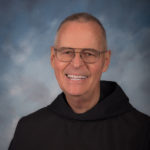 Br. Daniel Sokol is a Benedictine monk at Prince of Peace Abbey in Oceanside, California.
Br. Daniel Sokol is a Benedictine monk at Prince of Peace Abbey in Oceanside, California.